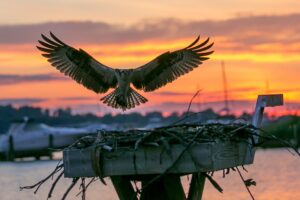Chesapeake Bay Watershed Task Force Co-Chairs Introduce Slate of Powerful Bay Restoration Bills
Reps. John Sarbanes (D-Md.), Bobby Scott (D-Va.), and Rob Wittman (R-Va.)
Annapolis, MD – Chesapeake Conservancy President and CEO Joel Dunn issued this statement following the introduction of a slate of bipartisan bills to reauthorize funding for conservation and clean-up efforts throughout the Chesapeake Bay Watershed.
“Today, we are celebrating our congressional leaders who understand the many challenges facing the Chesapeake Bay, are committed to addressing them and recently took meaningful action by introducing a slate of bills that would empower restoration efforts at this pivotal moment.

Photo Credit: Michael Weiss
“We are particularly grateful to the Chesapeake Bay Watershed Task Force Co-Chairs, Representatives Rob Wittman (R-Va.), Bobby Scott (D-Va.) and John Sarbanes (D-Md.), whose trio of bills would reauthorize funding to promote recreation, conservation, and clean-up efforts made possible by three of our federal partners: the EPA, the U.S. Fish and Wildlife Service, and the National Park Service.
“Maintaining ecosystem function and keeping the magic of the Chesapeake Bay in the face of climate change, habitat destruction and other factors depends on the collective conservation and restoration efforts happening throughout the watershed. Fortunately, there are signs of hope and excellent examples of progress, and now is the time to step up and accelerate proven methods.
“Chesapeake Conservancy greatly appreciates the bipartisan leadership of the Congressional delegation from across the 6-state watershed (MD, VA, WV, DE, PA, NY) to conserve, restore and access the Chesapeake Bay through these important bills. Chesapeake Conservancy is working with most members to permanently reauthorize the National Park Service’s Chesapeake Bay Gateways program, the USFWS Chesapeake WILD program and the EPA Chesapeake Bay program this Congress.”
The three bills would extend funding through Fiscal Year 2030, authorizing:
- $100 million per year for the Chesapeake Bay Program, the successful federal-state partnership that coordinates efforts to reduce pollution in the Bay;
- $15 million per year for the Chesapeake WILD Grant Program, which helps local entities rehabilitate fish and wildlife habitats through the Bay Watershed; and
- $6 million per year for the Chesapeake Bay Gateways and Watertrails Network, which supports efforts to improve the condition of habitats and enhance public access to the Bay and its rivers.
These programs were last authorized through the America’s Conservation Enhancement Act, which became law on October 30, 2020.
###